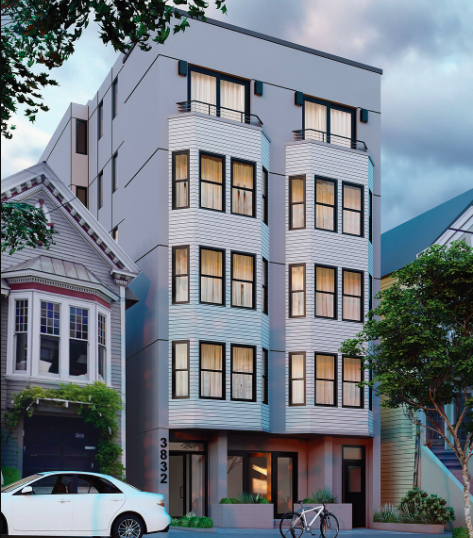Just a couple of hours after approving a law that would redefine “group housing” and close a developer loophole, the Board of Supes approved Tuesday a version of a very dubious group-housing project that would violate that new law—and that the developer insists won’t get built.
It was a weird moment in the weird world of housing politics, and it shows how the concept that the free market will build housing for people who need it, particularly families with kids, is just out of touch with reality.

The project on 18th Street would replace a small single-family home, which would be demolished, with a five-story building that would include 19 tiny studio units.
The developer argues that the units fall under the city’s group-housing category, which allows very dense facilities with no individual kitchens. Under the original plan, the new building would rise six stories, dwarfing the existing buildings on the block.
The Planning Commission agreed to allow it—but only at five stories, which might mean that a bicycle parking area and a group kitchen would have to go.
The developer, Vanguard Properties, represented by landlord and developer lawyers Zacks, Freedman and Patterson, contends that the reduction of one floor would render the project financially infeasible—and that state law mandates that the city approve it.
This is potentially, Sup. Rafael Mandelman said, a setup to a lawsuit by the developer, which is identified as MJ Mission Dolores LLC. That name, state records show, is registered to James Nunemacher, the founder of Vanguard Properties.
It’s also an example of what happens when the state Legislature changes the rules for local land use without fully understanding the issues at hand.
The developer is using the state Density Bonus Law to demand an extra floor because three of the units will be below-market rate. Combine that with the new group-housing concept, and you get a building that’s out of synch with the neighborhood and that will very likely wind up being corporate condos.
“It’s so close to Dolores Park, I can see Google or Facebook buying these condos and using them for new or short-term workers who won’t have to cook anyway,” Thanos Diacakis, one of the neighbors who appealed the project, told me.
These folks aren’t Yimbys; they all agree, Diacakis said, that the single-family house at issue should be replaced with something bigger and with more units at higher density.
They even offered the developer several alternative designs that included at least a few one-or-two bedroom units.
But all of that was rejected.
As Mandelman said in the hearing, most of these appeals in his district get resolved when neighbors work with developers. “But in this case we spent a lot of time talking, but the talking didn’t lead to a compromise. If feels to me like this is a setup for litigation against the city; the developer says there is no other project for this site that is feasible, and I find that interesting.”
He also noted:
“These don’t feel like group housing units. They are small condos.” He noted that the new residents, who would be paying upwards of half a million for the units, are likely to install full kitchens once they’ve move in.
The Planning Department said that—if they bothered to get permits—a new kitchen would require a conditional use permit. “I would do that,” Mandleman said.
Diacakis testified that the project isn’t compliant with any of the city’s policies, which encourage family housing.
Yet Ryan Patterson, a lawyer for the developer, told the supervisors that under state law, the city had no choice but to approve the six-story project.
But there’s a deeper issue that came up at the hearing: Private developers don’t make as much money building market-rate family units, so they are shifting to this kind of housing.
Patterson asked the supes to overrule the Planning Department’s decision and restore the sixth floor. Without that extra space for 25 bike parking spaces and a common kitchen, he said, “there is no market” for these new units.
Mandelman said that the Planning Department—which is decidedly pro-housing—was unable to make findings that found the six-story project was consistent with city policy.
He moved that the supes deny both the neighborhood appeal and the developer’s demands and approve what the planners wanted. His motion passed unanimously.
That means one of two things: The developer isn’t telling the truth, and can in fact make this project work at five stories—or nothing is going to get built and the developer will either sell the site or sue the city.
The message I get from this is pretty clear: The private market today is only able to fund these tiny dorm units. It’s not the Yimbys or CEQA or the conditional-use process that is preventing more housing to fit the city’s needs. It’s our reliance on the market.





